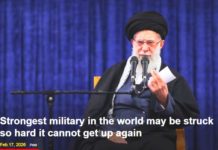By Shaimaa Eid in Gaza
Oct 6, 2025
The return of this name to the scene in Gaza signals the return of the same policies that set the Middle East on fire, writes Shaimaa Eid.
Amid growing controversy over Donald Trump’s plan to end the war on the Gaza Strip, one aspect has caused particular concern.
That is the suggestion Britain’s former prime minister Tony Blair could be a “temporary governor” of Gaza.
Palestinians, exhausted by war and stripped of their homes and loved ones, view this move as an attempt to reimpose foreign guardianship over Gaza.
Voices of anger and rejection are rising from the displacement tents in Al Mawasi, Khan Younis.
Here, people fear an extension of old colonial projects resurfacing today under a new political guise.
‘Colonial Guardianship’
Palestinian journalist Rifka Al Amya describes the idea as “insulting and outrageous,” telling Declassified:
“I strongly object to the notion of Tony Blair or any foreign figure being appointed as a temporary governor of the Gaza Strip. I see it as a renewed form of colonial trusteeship that has long ignored the Palestinian people’s right to self-determination.”
Al Amya adds firmly that what is being proposed today, after two years of systematic genocide and 77 years of oppression, ethnic cleansing, and massacres, reveals a deep disregard for the history and struggle of the Palestinian people — and a desire to impose solutions that diminish their rights rather than restore them.
She believes that what is happening confirms that the international community has not only allowed violence against Gaza, but is also actively working to cement a political reality that takes us back to a time even worse than before.
‘No One Here Needs a Foreign Ruler’

Aerial view of the Al-Mawasi area, where displaced Palestinians live in tents, January 2025. (Ashraf Amra, UNRWA: United Nations Relief and Works Agency for Palestine Refugees in the Near East, Wikimedia Commons/CC BY-SA 3.0)
.
ust a few metres from the sea in Khan Younis, Abdel Fattah Al Amssi, a man in his seventies, sits on the hot sands of Al Mawasi under the blazing sun beside his torn tent.
When asked about Tony Blair, he erupted angrily:
“Blair? Isn’t he the one who stood with Bush in the Iraq war? What did he do there except bring destruction? And now they want to send him to rule Gaza? This is an insult to the people of Gaza who have made sacrifices, and an insult to the entire Palestinian people.”
Al Amssi then gestured toward the endless stretch of tents, saying: “No one here needs a foreign ruler. We have our own men and women capable of managing their country.
“Blair will not come to show us mercy, but to serve the interests of those who want Gaza disarmed, without resistance or dignity.”
The elderly man, who has lived through all of Gaza’s wars since 1967, concludes with a stern tone filled with disappointment and lost trust:
“Those who have endured displacement and death will not surrender their fate to a man whose hands are stained with the blood of Arabs. We completely reject that, because after this genocide, we trust no one but ourselves.”
‘Replacing One Occupation With a More Elegant One’

Jabalia camp destruction by Israel in Gaza, October 2024. (Al Jazeera/Wikimedia Commons/CC BY 4.0)
.
From another tent set up amid the sands, 28-year-old Imad Saif, displaced from Gaza City whose home was destroyed by the occupation in Jabalia Camp, speaks as he tries to build a makeshift toilet for his family beside the tent.
“We want to govern ourselves, not be ruled by a man who was once a friend to those who destroyed Gaza and forced us to live through displacement and oppression,” he says.
“What is being proposed to us is not a solution, but a replacement of one occupation with a more elegant one. The West has never come to show us mercy.
The person they appoint as our ruler today is the same one who supported the wars of yesterday. We do not want anyone to govern us; we just want to live with dignity and rebuild our homes with our own hands, not by orders from abroad.”
Imad’s words, along with those who spoke before him, reflect a widespread sentiment among Palestinians here in Gaza: that the West continues to view Gaza through the lens of control and management, rather than justice and rights.
‘Foreign Rulers Bring Nothing But Destruction’
Amid a scene that encapsulates the tragedy, with tents stretching endlessly across the horizon, Naima Al Astal, a woman in her late sixties, sat trying to light a small stove using dry firewood to prepare a cup of tea.
She was too exhausted to speak, but when asked about the idea of Tony Blair overseeing Gaza, she responded with a few words that summed up seven decades of waiting.
“We are tired of experiments,” she said.
“Every time, they tell us the solution will come from outside. But foreign solutions only bring us destruction, devastation, and misery. If anyone truly wants to help Gaza, let them stop the war, not come to rule over us.”
‘Bloody Legacy That Cannot Be Erased’
Many Palestinians associate the name Tony Blair with the 2003 war on Iraq, when he took part in an invasion that devastated an entire Arab country under the pretext of “spreading democracy.”
For them, the return of this name to the scene in Gaza signals the return of the same policies that set the Middle East on fire.
In every interview with a displaced person, a journalist, or an elder, the same message is repeated: a rejection of guardianship, a firm hold on dignity, and a demand for the right to self-determination.
Shaimaa Eid is a Palestinian journalist in Gaza. She specialises in human-interest and news reporting, with a focus on amplifying local voices and documenting life under occupation. Shaimaa is a contributor to The Electronic Intifada and Palestine Chronicle.
We remind our readers that publication of articles on our site does not mean that we agree with what is written. Our policy is to publish anything which we consider of interest, so as to assist our readers in forming their opinions. Sometimes we even publish articles with which we totally disagree, since we believe it is important for our readers to be informed on as wide a spectrum of views as possible.











